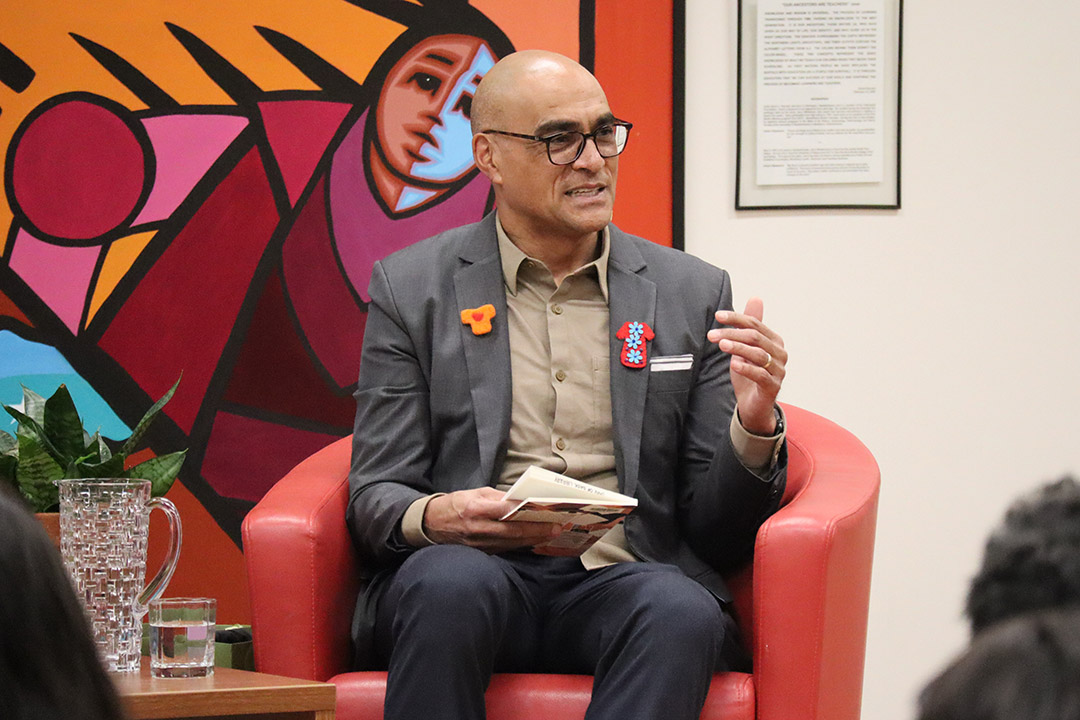
Memoir by USask Vice-Provost Cranston explores themes of identity
“The book is a gift to my children. I want my children to know where we come from.”
By Connor JayUniversity of Saskatchewan (USask) Vice-Provost, Students and Learning Dr. Jerome Cranston (PhD) launched his latest book Half-Caste: Decidedly Brown in a Black or White World in an event hosted by the College of Education at the Education and Music Library on January 30.
Cranston is a race-conscious scholar-educator who focuses his energy and time on uncovering the overt and covert ways that racialized ideologies, structures, and institutions create and maintain racial inequality and injustice with a goal of collectively finding solutions that can lead to greater equity and racial justice, and build healthier communities. He previously served as the dean of the Faculty of Education at the University of Regina. This is his fifth book.
Education Dean Dr. Julia Paulson (PhD) guided the conversation with Cranston, while Vice-Provost, Indigenous Engagement Dr. Angela Jaime (PhD) emceed the event.
Cranston began the evening with an excerpt from his memoir. He touched on the themes of his identity as being decidedly Brown, finding community with other marginalized groups and the resistance to fitting into the dominant group’s ideologies.
“Everything in the world tries to shape your identity and tell you who you are and who you’re supposed to be,” said Cranston. “Claiming to be Brown is a bit of a resistance to the way that folks want to portray me.”
When reflecting on his immigration journey, Cranston stated that he is proud of how hard he worked to become a Canadian citizen.
“I will never stop knowing I’m an immigrant. I came over [at the age of four] in the low, low chambers on a boat. I had to work hard to be a Canadian. With respect to those of you who were born Canadians, I’m not sure you realize how hard those of us who are immigrants have to work. We have to work to get that citizenship and we never take it for granted.”
Cranston discussed how he found acceptance with Indigenous, Black, and Brown communities.
“Without knowing where I come from, the communities who have invited me and called me in have been everything to me. I’m unbelievably indebted to them because they have made me feel like I belong.”
As the memoir dives deeper into Cranston’s family history, he recognized that he was writing the book as a gift for his children.
“I want my children to know where we come from. I don’t want them to live with the unknowns, and there are lots of unknowns in the book. I want them to be able to look at who they are, where we came from and to have some grounding in it.”
He wants to continue to disrupt the systems in place so that hard-working racialized people are provided similar opportunities to their white colleagues.
“If you’re Indigenous, Black, or Brown, the higher you get in the system, the bigger price you’re going to pay for even the slightest mistake. Our [Indigenous, Black, Brown] communities have the saying, ‘You need to work twice as hard to get half as far.’ I’ve worked so hard to get where I am today. I am so appreciative to be here and to be surrounded by amazing people, but I know how hard I worked because the system wasn’t built for me.”
The full conversation can be found at the College of Education’s YouTube page. Half-Caste: Decidedly Brown in a Black or White World can be purchased here.
Together we will support and inspire students to succeed. We invite you to join by supporting current and future students' needs at USask.

